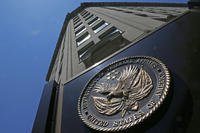U.S. airstrikes hit dozens of Islamic State targets in central Syria on Sunday as President Joe Biden cautioned that Bashar al-Assad’s fall from power could open the door to a resurgence of Islamic extremism.
“We’re clear-eyed about the fact that ISIS will try to take advantage of any vacuum to reestablish its capabilities and create a safe haven,” Biden said in remarks at the White House. “We will not let that happen.”
About 900 U.S. troops are deployed to Syria as part of a mission to prevent a resurgence of Islamic State. Biden said that mission “will be maintained.”
The rebel group that led the sweep across Syria that toppled Assad, Hayat Tahrir Al-Sham, is a breakaway faction of al-Qaeda that today casts itself as more moderate. Known as HTS, it’s classified as a terrorist organization by the U.S. and other countries.
“We will remain vigilant,” Biden said Sunday. “Make no mistake, some of the rebel groups that took down Assad have their own grim record of terrorism and human rights abuses.”
Dozens of U.S. airstrikes using B-52 bombers and F-15 fighters struck more than 75 targets, including ISIS leaders, operatives and camps, the U.S. Central Command said in a statement.
“We will not allow ISIS to reconstitute and take advantage of the current situation in Syria,” Centcom commander General Michael Kurilla said in the statement. “All organizations in Syria should know that we will hold them accountable if they partner with or support ISIS in any way.”
At the White House, Biden hailed a “moment of historic opportunity” for Syria and the Middle East while saying it’s “also a moment of risk and uncertainty.”
The rapid advance of rebel groups in the past two weeks ended Assad’s rule since 2000, and more than a half-century of power by his family.
“At long last, the Assad regime has fallen” in a “fundamental act of justice,” Biden said. Assad had backing from Russia, Iran and the Lebanese militant group Hezbollah, but “all three of them are far weaker today than they were when I took office,” he said.
Biden pledged to support Syria’s neighbors — Jordan, Lebanon, Iraq and Israel — against any threats arising from Syria; to focus on ensuring stability in eastern Syria and protecting U.S. troops and Americans in Syria; and engaging with all Syrian groups as they form a new government.
Biden faces a tight timeline for any action on Syria, as the administration keeps up heavy involvement in Israel’s multi-front war and prepares to pass the baton to President-elect Donald Trump, who has signaled a more isolationist stance in global conflicts, including Syria and the broader Middle East.
_____
(With assistance from Alicia Diaz.)
_____
©2024 Bloomberg L.P. Visit bloomberg.com. Distributed by Tribune Content Agency, LLC.









